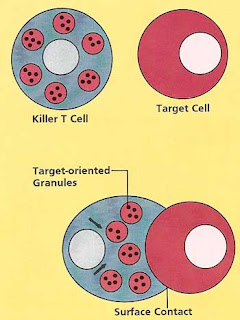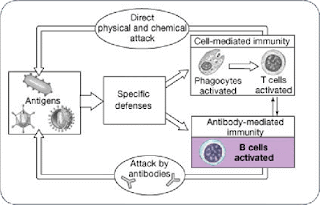When your non-specific immunity fails to kill the pathogen, the specific immunity is called.
Antigens are the foreign molecules that enter into your body, and the antibodies are proteins made in response to a specific antigen.
In the specific immunity, Lymphocyte T cells ( which are leucocytes) respond:
- Killer T cells, release enzymes destroying the invading foreign molecules.
- Helper T cells , stimulate other lymphocytes B cells, to form antibodies.
Antibodies help the body to build defenses in two ways:
- Active immunity: the body makes his own antibodies in response to an antigen. It can be also achieved by an artificial immunization through vaccination ( giving a vaccine by mouth), so that your body can respond quickly when it later faces the same antigen, because the blood is already containing the antibodies needed.
- Passive immunity : antibodies are produced in another animals and being produced into your body. it doesn't last for long period as the active immunity
What are the 4 steps of a response to disease-causing organisms??
Antigens are the foreign molecules that enter into your body, and the antibodies are proteins made in response to a specific antigen.
In the specific immunity, Lymphocyte T cells ( which are leucocytes) respond:
- Killer T cells, release enzymes destroying the invading foreign molecules.
- Helper T cells , stimulate other lymphocytes B cells, to form antibodies.
Antibodies help the body to build defenses in two ways:
- Active immunity: the body makes his own antibodies in response to an antigen. It can be also achieved by an artificial immunization through vaccination ( giving a vaccine by mouth), so that your body can respond quickly when it later faces the same antigen, because the blood is already containing the antibodies needed.
- Passive immunity : antibodies are produced in another animals and being produced into your body. it doesn't last for long period as the active immunity
What are the 4 steps of a response to disease-causing organisms??
 Source of the image :Could You Ever Live Forever : (www.daviddarling.info/
Source of the image :Could You Ever Live Forever : (www.daviddarling.info/ Source of image: Nephrology (www.cyberounds.com/cmecontent/art394.html)
Source of image: Nephrology (www.cyberounds.com/cmecontent/art394.html)

No comments:
Post a Comment